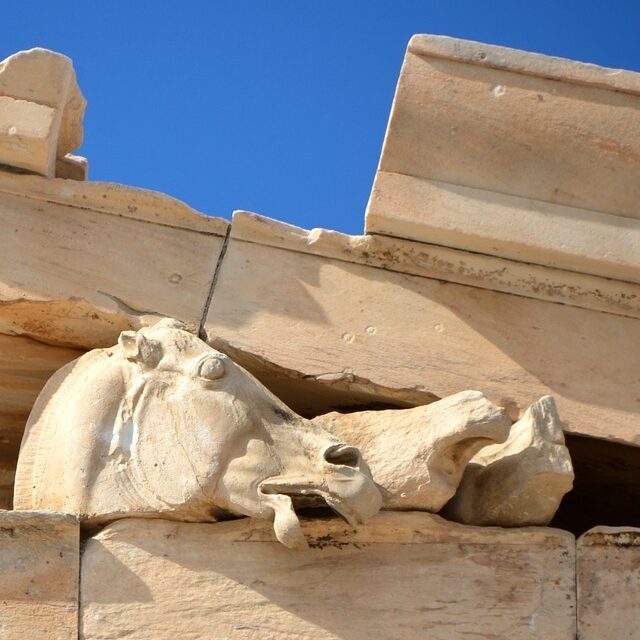
Dear Thucydides of Athens, son of Olorus
Dear Thucydides of Athens, son of Olorus,
If you don’t mind me asking—you know this section in the manuscript tradition of your history of the war between the Peloponnesians and the Athenians, which modern editions refer to as Chapter 84 of Book 3? The one beginning with “It was in Corcyra, then, that most of these outrages were first perpetrated […]”?
Did you write it?
I’ve been reading up on it for my History class. Most scholars since antiquity have rejected it as a later interpolation. On the other hand, I have seen some good arguments in defense of it, too. Take W. Robert Connor’s comment, for example:
“Many of the objections, however, could apply to other sections in Thucydides, not least to the two preceding chapters. And, one wonders cui bono? Who except Thucydides would write such a piece and why? Would even the most fervent imitator create a sentence such as the first one in this chapter? And how would such an imitation come to be included in the text? It seems much more likely, as E. Schwartz suggested, that chapter 84 is an earlier version of chapters 82-83, inadvertently included in the text.”1
Apologies if my question comes at a bad time—I know you must’ve been very busy lately. You are the historian of the great Plague of Athens,2 and in this time of COVID-19 there is no shortage of people calling upon you for guidance.3 And before that, the IR crowd was taking your line about how the truest cause of the Peloponnesian War was because “the Athenians were becoming powerful and inspired fear in the Spartans”4 to explain why there’s likely to be World War Three between Trump and China or whatever, so clearly we are not letting you go any time soon.5
I hope we have been playing with your text the way you wanted, at least. After all, you did say that your work was meant to be a “possession for all time”, because, with “the human condition being what it is”, similar things can be expected to happen again.6 And when you went into great details about the Plague, it was not just because the scale of the outbreak and the despair overwhelmed civic structures and institutions and led to widespread lawlessness in the city,7 but also because you wished to provide all the facts, so future witnesses could recognise the disease the next time it broke out.8
Where I’m from, we are in the middle of both a pandemic, and protest movements pointing out the great inadequacies and injustice of our societal system, so we are definitely in need of some guidance right now.
My question, I must admit, is prompted by much more parochial concerns though. I have ADHD—as can be seen by my propensity for em dashes, commas, and sentences with too many clauses. You, too, wrote long sentences with too many clauses, that were famously difficult even for other Greek speakers—as Dionysius of Halicarnassus said, “the number of men who can understand the whole of Thucydides can easily be counted, and even these cannot understand certain passages without a linguistic commentary”.9 Half of W.R. Connor’s argument above practically boils down to this sentence is so convoluted, it must’ve been Thucydides’. Which means the moment I read it, I felt such a sense of kinship with that passage, and with you.
That is a problem because, again, I don’t even know if 3.84 is even yours at all. And more to the point, I do have to wonder: am I projecting too much of myself into the text? The corollary of ‘Thucydides is very difficult to read’ is of course ‘anyone can read Thucydides however they like, if they don’t pay attention to the nuances’. I have seen you being taken as a deeply, deeply cynical man with very dim views on human nature. I have also seen you being adduced as evidence that Athens was a place where, even with the spectre of the Plague at its worst, altruism still existed, where some people still chose to care for the sick at the risk of their own lives.10 To learn from Thucydides is a task that requires careful reading and reflections, and my country’s dēmagōgoí are doubling the cost of Humanities degrees, so evidently they don’t want us to do that.
Right now, I just hope people remember that while you focused the most on the original outbreak of 430 BC, you made it very clear that the Plague stuck around for many, many more waves afterwards.11
Regards,
Athenodora
–
- Connor, W.R., Thucydides, Princeton University Press, Princeton 1984, 102n60.
- Thuc. 2.47–55, 3.87.
- e.g. D’Angour, A., ‘Coronavirus: What Boris Johnson’s Greek hero teaches us about epidemics’. www.bbc.com/news/uk-52236388, accessed 21/06/2020.
- Thuc. 1.23.6.
- Allison, G., ‘The Thucydides Trap’, https://foreignpolicy.com/2017/06/09/the-thucydides-trap/, accessed 21/06/2020.
- Thuc. 1.22.4.
- Thuc. 2.53.
- Thuc. 2.48.3.
- Dion. Hal., Thuc. 51.
- Herman, G., Morality and Behaviour in Democratic Athens: A Social History, Cambridge University Press, Cambridge 2009, 349, citing Thuc. 2.51.
- Thuc. 3.87.1.
Bibliography
Allison, G., ‘The Thucydides Trap’, https://foreignpolicy.com/2017/06/09/the-thucydides-trap/, accessed 21/06/2020.
Connor, W.R., Thucydides, Princeton University Press, Princeton 1984.
Dionysius of Halicarnassus, Critical Essays, Volume I: Ancient Orators. Lysias. Isocrates. Isaeus. Demosthenes. Thucydides, trans. S. Usher, Loeb Classical Library 465, Harvard University Press, Cambridge, Mass. 1974.
D’Angour, A., ‘Coronavirus: What Boris Johnson’s Greek hero teaches us about epidemics’, https://www.bbc.com/news/uk-52236388, accessed 21/06/2020.
Herman, G., Morality and Behaviour in Democratic Athens: A Social History, Cambridge University Press, Cambridge 2009.
Thucydides, The War of the Peloponnesians and the Athenians, trans. J. Mynott, Cambridge Texts in the History of Political Thought, Cambridge University Press, Cambridge & New York 2013.
Athenodora has a Bachelor of Arts, majoring in Ancient History, from the ANU, and is doing long-distance postgrad study at the University of New England. She loves cats, and thinks more people should check out the ANU Centre for Classical Studies (https://www.facebook.com/pg/anu.classics.ancient.history).
